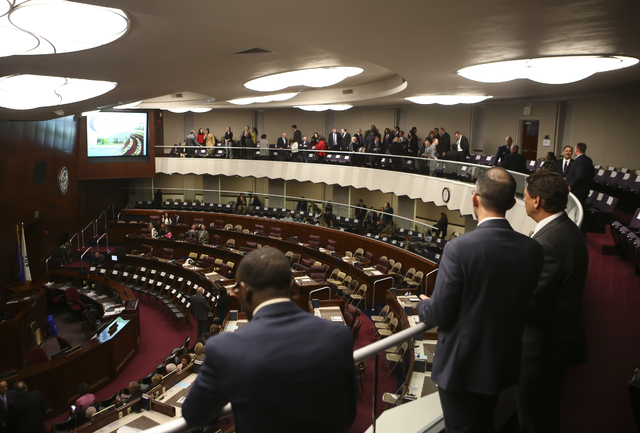Property tax cap fix brings another tax debate to Carson City
It might be hard to conceive of yet another debate over taxes in the Nevada Legislature.
After all, we just got done with a special session that raised room taxes to pay for a new NFL football stadium and sales taxes to pay for more police officers.
And that happened after the Legislature met to hand out tax breaks to electric car manufacturers Tesla and Faraday Future in special sessions known for their generosity and brevity.
And that came on the heels of the 2015 session, at which lawmakers and Gov. Brian Sandoval passed a new commerce tax on business.
Another debate on taxes risks a full-on Tea Party rally on the steps of the legislative building.
But it appears that’s exactly what’s going to happen as lawmakers take up reforming the property tax caps.
Make no mistake: This is going to be a political fight. Senate Minority Leader Michael Roberson — without whom the commerce tax would not have passed — says he will oppose any property tax proposal that raises taxes.
But local governments and school districts that have seen their tax bases erode because of the recession are pushing for a fix that will increase tax revenues.
The genesis of the problem came in 2005, when Las Vegas boom times saw property values skyrocket. Homes sold at ridiculous prices and speculators played the real estate market like a roulette table that nearly always paid off.
Then-state Sen. Dina Titus, D-Las Vegas, proposed a property tax freeze for two years, to protect homeowners from losing their houses because they couldn’t afford to pay the higher taxes. Her bill was ultimately rejected in favor of a complex property tax cap that limited annual increases to 3 percent for homeowners and 8 percent for commercial property.
Then the recession hit in 2007, and Las Vegas property values plummeted back to earth. So did the property taxes that pay for everything from police officers to schools.
But thanks to the caps, even when home values began rising again, taxes didn’t keep pace. In fact, they didn’t rise anywhere close to 3 percent or 8 percent. According to Jeremy Aguero, the research guru who has advised governors and lawmakers on tax issues for years, the effective tax rate increase in the past fiscal year was 0.2 percent.
Why? Because a secondary cap in the law creates a complex calculation to govern the rise of commercial property tax. And a second provision says residential property taxes can never increase higher than commercial taxes, effectively limiting the growth of both.
In practical terms, it means property tax revenues to local governments won’t reach pre-recession levels for a generation, Aguero says. And that’s true even if property values come back to what they were before the crisis.
Local governments — via the Nevada Association of Counties — have proposed Assembly Bill 43, which would provide that property tax rates increase by at least 3 percent per year, a floor rather than a ceiling. That approach would help local governments, but it would also see property tax bills rise higher than they would under the caps.
For those homeowners who lived through the recession, loosening the caps might be worrisome, especially if Las Vegas real estate prices rebound to previous heights. But for local governments struggling to regain the tax base hollowed out by the recession, the current rate of growth is far too slow.
And for the elected officials who must decide the issue, it’s a political pickle that pits the needs of taxpayers against the needs of local governments to provide the services that those taxpayers expect. And it means that, once again, taxes will be a hot subject in Carson City.
Steve Sebelius is a Review-Journal political columnist. Follow him on Twitter (@SteveSebelius) or reach him at 702-387-5276 or SSebelius@reviewjournal.com.






















